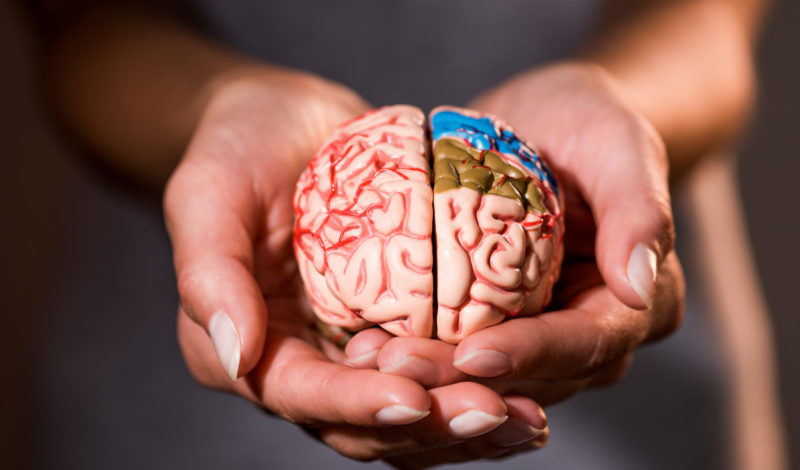The intestine can digest much more than "just" food: A network of around 100 million nerve cells runs through the entire gastrointestinal tract and [...]

How your bowel triggers stress and stress burdens your bowel
“Stress hits the stomach”: You’ve probably experienced the real effects of that saying yourself. The entire digestive tract is closely linked to the central nervous system. Stress and the stomach have a strong connection. Digestive disorders are therefore a frequent reaction to mental stress. Here you can find out how stress upsets the intestines and how the intestines can cause stress.
Stress and stomach: a lively exchange
Your intestine does amazing things for your health every day: it regulates your nutrient intake, is involved in your immune system and is home to millions of microorganisms of the intestinal flora. It is also permeated by around 100 million nerve cells: This autonomous nervous system regulates digestive processes and some functions of the immune system. The vagus nerve connects this “belly-brain” (enteric nervous system, ENS) to the brain (central nervous system, CNS) via the spinal cord: This so-called intestinal-brain axis enables a mutual exchange between the two nervous systems via hormones and neurotransmitters. But a mutual relationship does not only exist between ENS and CNS: the intestine and psyche also influence each other in this way.
When the bowel is stressed or stress hits the bowel
If the intestine is under stress, this often manifests itself as digestive problems. The sympathetic nerve is responsible for this among other things: it is part of the vegetative nervous system and always takes over the control of the body processes when stress requires a spontaneous, increased willingness to perform (fight or flight). Adrenalin and cortisol are then released, the heartbeat accelerates, blood circulation and breathing rate increase. To enable this short-term increase in performance, energy is withdrawn from the gastrointestinal tract. Normal intestinal activities are reduced, the movement of the intestine slows down or comes to a complete standstill. Chronic stress can therefore promote constipation. Acute stress, on the other hand, can increase the short-term release of water and electrolytes: “anxiety diarrhoea” can then be the result.

The intestinal flora also suffers from stress
The intestinal flora is also affected by chronic stress. The increased release of stress hormones can reduce the biodiversity of the bacteria living in the intestine and cause a decrease of the useful lactic acid producing bacteria (lactobacilli and bifidobacteria). The food consumed becomes more difficult to digest due to the decrease in bacteria, which can initially result in abdominal pain and later in diarrhoea or vomiting. In addition, when the lactic acid-forming bacteria decrease, the pH value of the intestinal environment shifts and thus offers less resistance to unwanted bacteria.
However, the stress-induced, slowed-down gastrointestinal passage can further shift the bacterial balance in the intestine: Putrefactive bacteria can displace useful bacterial strains such as lactobacilli and bifidobacteria. The latter are significantly involved in the production of the amino acid tryptophan, which is needed for the production of serotonin. A decrease in bifidobacteria can thus also manifest itself in a serotonin deficiency. The consequence: stress resistance decreases even further.
Stress and stomach: How the intestinal flora affects your stress resistance
Your stress resistance is therefore determined by the composition of the microbiome in your intestine. Some strains of bacteria, such as bifidobacteria, are involved in the production of neurotransmitters that are important for communication between the intestine and the brain. Examples include serotonin, dopamine and GABA (gamma-aminobutyric acid). Some strains of bacteria, especially lactobacilli and bifidobacteria, can also help to reduce the level of stress hormones such as cortisol. They enable an optimised absorption of nutrients in the intestine and create an acidic intestinal environment that is hostile to most undesirable bacteria.
It can therefore be useful to support your beneficial intestinal bacteria in a targeted manner through diet or the administration of probiotics. With the modern biotechnological analysis method1 INTEST.pro from BIOMES you will get a comprehensive overview of the current bacterial composition in your intestine. Based on the results of the analysis, BIOMES experts will also provide you with a personalized recommendations.
What is a stress belly?
Unexplained abdominal fat and painful flatulence: When the stomach causes stress, often the stress itself is the cause. Your body reacts to chronic stress by releasing the hormone cortisol, among other things. In addition to the effects of the stress hormone on your digestive system described above, cortisol also has a negative effect on your insulin level and it inhibits the breakdown of fat. This function of cortisol should provide our ancestors in exceptional situations with a particularly large amount of energy and allow them to survive for a few days even without food. The energy provided by cortisol is stored in visceral fat: This inner abdominal fat forms the typical stress belly. However, too much inner abdominal fat can be detrimental to your health. The stress belly is also often accompanied by the typical stress-related digestive problems such as flatulence, cramps or constipation.
What helps against a stress belly?
What to do on a stress stomach? Relaxation, a balanced diet and moderate exercise are the most important measures. In addition, the following tips can help you:
- Try to take your meals in peace and quiet and eat slowly.
- Integrate sufficient exercise into your everyday life to stimulate intestinal movement.
- Replace ready meals and simple carbohydrates with nutritious and fibre-rich foods that can serve as an energy source for beneficial intestinal bacteria.
- Drink plenty of still water.
- Yoga, autogenic training and other relaxation techniques can help you to find peace of mind.
1. Cho I, Blaser M J. The human microbiome: at the interface of health and disease. Nature Reviews Genetics 2012:13, 260-270. https://www.nature.com/articles/nrg3182 ↩



